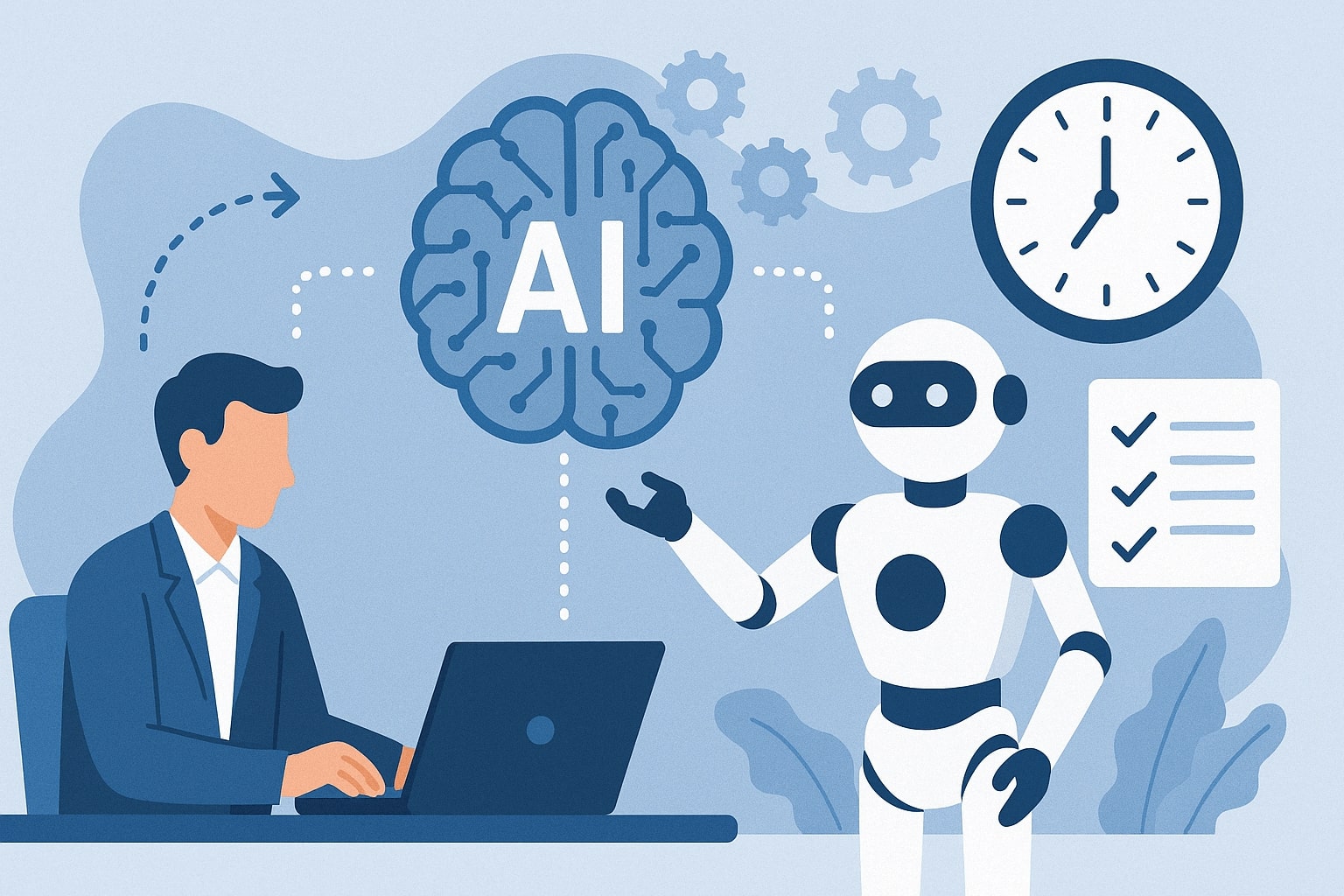Maximize Efficiency with AI Automation for SMEs

Save Time Automating Tasks with AI Automation
Estimated reading time: 7 minutes
- AI automation enhances operational efficiency, saving significant time for employees.
- Automates repetitive tasks, allowing focus on strategic initiatives.
- Error reduction leads to improved accuracy in various business functions.
- Offers scalable solutions across multiple industries.
- Implementing AI requires careful consideration of ethical aspects and workforce adaptation.
Table of Contents
- The Landscape of AI Automation
- Time-Saving Features of AI Automation
- Applications Across Industries
- Key Benefits of AI Automation
- Challenges and Considerations
- Practical Takeaways for Business Owners
- Conclusion
- FAQ
The Landscape of AI Automation
AI automation refers to the use of artificial intelligence technologies to perform tasks traditionally completed by humans. By taking on repetitive and mundane tasks, AI allows employees to allocate their time to more valuable activities that require creativity, strategic thinking, and interpersonal skills. As we explore the various capabilities of AI automation, we will provide practical insights on how SMEs can adopt these technologies effectively.
Time-Saving Features of AI Automation
1. Automating Repetitive Tasks
One of the most obvious benefits of AI automation is its ability to handle repetitive tasks efficiently. These include data entry, scheduling appointments, monitoring activities, and generating reports. By automating these tasks, companies can free up significant amounts of time for their employees, enabling them to focus on high-value strategies.
- Invoicing: AI can autonomously generate and send invoices, which minimizes errors and ensures timely payments. This functionality is particularly beneficial for businesses that maintain a consistent invoicing schedule (source).
- Data Entry and Processing: The elimination of bottlenecks associated with human inaccuracies makes AI a reliable choice for data-related tasks (source).
2. Workflow Optimization
AI tools streamline workflows by integrating disparate tasks and automating entire processes. This is particularly advantageous across various sectors:
- Legal and Tax Practices: Legal professionals benefit significantly by automating document creation and compliance checks, saving an estimated 40-60% of their time. Tax professionals can also use AI to monitor regulatory updates without manual oversight (source).
- IT and Support Tasks: When used in IT support, AI chatbots can resolve support tickets swiftly by collecting necessary information and recommending solutions (source).
3. Enhanced Decision-Making
Effective decision-making often hinges on timely access to relevant data. AI excels in this area, analyzing vast datasets quickly to extract actionable insights. This capability is invaluable in sectors such as finance, where AI can automate risk assessments and detect potential fraudulent activities (source).
4. Error Reduction
Automation helps significantly decrease human errors. For example, automating payroll processing or expense tracking ensures precision and compliance, allowing businesses to maintain accurate financial records (source). This not only saves time but also protects businesses from costly mistakes.
Applications Across Industries
The impact of AI automation extends to various industries, providing solutions tailored to their specific needs:
1. Healthcare
In the healthcare sector, AI is revolutionizing patient care by facilitating accurate disease diagnoses and enabling precision surgeries. Furthermore, predictive patient monitoring systems are capable of foreseeing complications before they arise (source).
2. Marketing
Marketing professionals use AI to optimize campaigns by automating social media scheduling and creating personalized outreach strategies. This not only boosts customer engagement but also frees marketers to focus on crafting more compelling creative content (source).
3. Manufacturing
In manufacturing, AI enhances inventory management, improves forecasting, and streamlines predictive maintenance, which collectively reduces operational delays and enhances overall efficiency (source).
4. Remote Work Environments
Amid the rise of remote work, AI tools, such as time tracking software, help teams manage their schedules efficiently, ensuring that tasks align despite geographic separation (source).
Key Benefits of AI Automation
Businesses that leverage AI automation can expect a variety of compelling benefits:
- Time Savings: Automating routine tasks can save employees upwards of 12 hours per week, allowing them more time to concentrate on strategic thinking (source).
- Cost Efficiency: Replacing repetitive tasks with AI systems helps in cutting down operational costs while maximizing ROI (source).
- Scalability: AI can readily adapt to growing workloads, making it ideal for businesses looking to scale rapidly (source).
- Improved Collaboration: The implementation of AI tools fosters better organization and information sharing across teams, particularly in remote or hybrid work settings (source).
- Continuous Operations: AI tools function around the clock, ensuring quicker task completion and faster customer responses to requests (source).
Challenges and Considerations
Paired with its numerous benefits, AI automation carries several challenges that businesses must consider:
- Initial Investment: The upfront costs of deploying AI solutions and the training required to integrate them into existing workflows can sometimes be substantial.
- Job Displacement: The potential for job displacement raises concerns about the workforce needing to adapt through upskilling and redefined roles (source).
- Ethical Concerns: There are also ethical considerations regarding the widespread implementation of automation and its implications, necessitating a balanced approach (source).
Practical Takeaways for Business Owners
To optimize your workflows and save time through AI automation, consider the following actionable steps:
- Identify Repetitive Tasks: Conduct a comprehensive review of your team’s workflows to pinpoint tasks that take up valuable time due to their repetitive nature. This exercise can highlight areas ready for automation.
- Incorporate AI Solutions Gradually: Begin small by introducing AI tools that can be easily integrated into your existing processes. Aim to scale your AI capabilities as your team gains comfort with the technology.
- Invest in Training Programs: To alleviate concerns of job displacement, consider developing training programs to help employees transition into new roles that leverage AI technologies.
- Monitor Performance Metrics: After implementing automation solutions, consistently track performance data to evaluate their impact on efficiency and productivity.
- Stay Informed on Ethical Guidelines: Discuss AI ethics and its applications in your industry. Building an ethical framework around the use of AI can not only guide implementation but also promote trust within your team and community.
Conclusion
AI automation presents a transformative opportunity for SMEs to save time, reduce errors, and enhance productivity. Companies that employ such technology can create a significant competitive advantage in their respective industries while allowing employees to concentrate on strategic tasks that drive growth. While challenges exist, they are manageable through careful planning, training, and ethical considerations. Embracing AI technology is not just a trend; it’s a strategic imperative for businesses looking to thrive in a rapidly evolving market.




